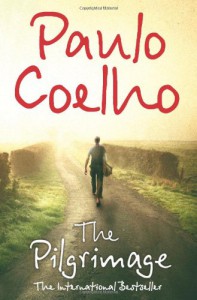

The Pilgrimage is the story of the author's experience of walking the ancient road to Santiago in northern Spain (Santiago de Compostela Camino). He presents his tale as a true story (and I believe it is true that Mr. Coelho walked the Camino) but it contains some strong esoteric (i.e., paranormal) elements that struck me as "embellished for effect." Even so, the story is another strong recounting of a seeker making this ancient pilgrimage and the wisdom he gained from it. As such, it is similar in tone to Shirley MacLaine's treatment of the subject in The Camino.
Mr. Coelho tells the story of his pilgrimage within a framework tale of trying to attain to a higher level of rank within an esoteric society he calls simply, "The Tradition" (in his words: "the great fraternity that is comprised of esoteric orders from all over the world"). Attaining this new level would be noted with the awarding to him of a sword. When he fails the final test, he is ordered by his fraternity master to perform a "redo" of the final test (penance?) by making the Santiago pilgrimage. If he succeeds, by finishing the pilgrimage and learning the lessons presented to him on the way, he'll receive his sword and rank of "master."
Another fraternity master is assigned to guide him in the journey. His name is, Petrus (a pseudonym says Mr. Coelho), and he provides instruction to Mr. Coelho along the way in the form of eleven exercises that are recorded in the book such that the reader can try them as well.
Mr. Coelho uses the same, very readable prose to effectively convey the wisdom and inspiration he experienced, as he used in his latter book, The Alchemist. The big differences are the "true story" baseline of this book and a slightly more martial tone. The latter is seen in the sword as a symbol of his desired rank and as a goal of this pilgrimage. He also refers to the idea of living life effectively as "fighting the good fight," where in The Alchemist he presented the same concept as "finding your personal legend." Both ideas work for what he is trying to say, I just prefer the latter.
Like The Alchemist, The Pilgrimage is full of quotable passages. Mr. Coelho has a knack for this and it tells me that he is a genuine seeker who has apparently had some major insights in his life. His gift is being able to share them with the world through his writing. While I think he does a better job of that in The Alchemist, there are some passages in The Pilgrimage that are golden. Such as:
Among the greatest sensations that I have experienced in my life were those I felt on that unforgettable first night on the Road to Santiago. It was cold, despite its being summer, but I could still taste the warmth of the wine that Petrus had brought. I looked up at the sky; the Milky Way spread across it, reflecting the immensity of the Road we would have to travel. This immensity made me very anxious; it created a terrible fear that I would not be able to succeed— that I was too small for this task.
The rest of the book is the account of Mr. Coelho learning to measure up, and for that, it is inspiring. Along the way, he converses with angels and demons, fights with a demon-possessed dog, and engages in an ancient Templar rite in a set of ruins in the dead of night. He presents all this as factual, and I won't dismiss it. The universe is big and I think we generally are far from understanding who we are and where we are. At the least, as with Shirley MacLaine's book, I can take such passages as instructional parables. It is probably the spiritual nature of the Santiago Road that prompts such tellings from its pilgrims.
Paulo Coelho's The Pilgrimage is a worthy addition to the body of tales of the Santiago de Compostela Camino. Its readable personal accounting of an individual's journey along an ancient roadway and through life, will inspire both the ardent traveler and the seeker of truth.

 1
1








